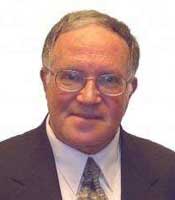The Name

The American economist and philosopher Henry George began a movement named after him, thus called Georgism or Georgist. Recently his followers have recognized that this name is unsatisfactory, because 1) the basic ideas preceded George, 2) there are other concepts in the movement that George did not concern himself with, 3) the desire is not to follow a particular man but to seek truth and justice. Therefore, many adherents are now calling the doctrine "geoism," geo standing both for land (as in geography) and for George. I will follow this usage here, having had some part in propagating it since the early 1980s, when I coined the word "geo-libertarian" for an article by that name which appeared in "Land and Liberty".
The Economics
We begin with the classical division of the inputs of production, or "factors" as economists call them. The three classical factors are land, labor, and capital goods.
Land includes all natural resources, and excludes all that is a product of human action. Labor is any human exertion in the production of wealth (goods and services). Capital goods are produced tools, goods which serve to produce other goods. All improvements to a location are capital goods, including clearing, draining, and preparing a site for construction.
The main type of land I will focus on here is real estate - the three-dimensional surface of the earth. What follows regarding land concerns only spatial land and not material land, wildlife, wind, or water. Labor and capital goods tend to be mobile. They can move, and the supply can increase. Spatial land, in contrast, is immobile and fixed. It cannot be moved, imported, or expanded.
"Rent" as used here refers only to the return on land, or the yield of land net of normal expenses. This rent is determined by the supply and demand in the market. The economic rent is not necessarily the same as the financial rent that a tenant may pay a landlord. For example, suppose a highest bidder for a leasehold would bid $1000 per month, but at present, the current tenant is only paying $600. The economic rent is $1000, not the $600. The economic rent is the same whether the land is rented to another person or is occupied by the title holder.
The economic rent can be estimated from recent sales and leases of real estate. In come cases, raw or undeveloped land is sold or leased, or the title to the land is separate from the title to the building, with a different owner. Otherwise, the rent is estimated as a residual: estimate the total property value from recent sales and leases, calculate the replacement value of the buildings and other improvements, subtract actual depreciation, and the remainder of the current property value is land value.
The price of land is related to the rent of land by the equation
p = r/i, where p is price, r is the annual rent (assumed to be constant), and i is the real interest rate (subtracting out inflation). The price is thus the capitalized future rents. If there is a tax or assessment on the land value, then the rent also pays that charge, so
p = r/(i+t), where t is the assessment rate based on p. For example, if the land value is $100,000 and the assessment paid is $2000, then t is .02 or two percent.
Given t, we can calculate the fraction f of the rent paid:
f = t/(i+t), so that if i=.05 and t=.20, 80% of the rent would be paid.
Alternatively, if f is known and we want to find t,
t = fi/(1-f)
Land value or rent arises from two sources. One is the natural advantages of a site relative to other sites. The greater advantages create a higher rent in the better land. The second source of rent is the civic infrastructure serving a location, such as streets, transit, parks, security, and utilities such as street lighting. These add to the demand for land, raising the rent and price.
The produced wealth is distributed as income to the owners of the factors of production. Landowners having title to its income get the rent. Labor gets wages. Capital goods get a rental or return. Each factor gets paid according to its contribution to output.
Anarchist Geoism
In a libertarian or anarchist world, some people might be unaffiliated anarcho-capitalists, contracting with various firms for services. But if we look at markets today, we see instead contractual communities. We see condominiums, homeowner associations, cooperatives, and neighborhood associations. For temporary lodging, folks stay in hotels, and stores get lumped into shopping centers. Historically, human beings have preferred to live and work in communities. Competition induces efficiency, and private communities tend to be financed from the rentals of sites and facilities, since this is the most efficient source of funding. Henry George recognized that site rents are the most efficient way to finance community goods because it is a fee paid for benefits, paying back that value added by those benefits. Private communities today such as hotels and condominiums use geoist financing. Unfortunately, governments do not.
Geoist communities would join together in leagues and associations to provide services that are more efficient on a large scale, such as defense, if needed. The voting and financing would be bottom up. The local communities would elect representatives, and provide finances, and would be able to secede when they felt association was no longer in their interest.
Statist Geoism
Imposed governments, as all are today, mainly tax income and the sale of goods. These taxes get added to the costs of production, making labor and goods more expensive, while reducing net wages and profits. Such taxes reduce employment, production, and investment. They create a deadweight loss or excess burden on the economy beyond the taxes paid.
Henry George's main aim was reform within the system. Given that states exist and impose taxation, what would be the way to minimize the oppression and burden. There is a lower excess burden on the economy if the public revenue comes from land rent than if it falls on labor, capital, or goods. The land does not diminish when taxed, so there is no reduction in production. There are also no audits or complicated records to keep. The use of rent is based on benefit: landowners benefit from civic works, and they pay back the increased rents and land values generated by them. While libertarians would prefer that civic works be privatized, so long as they are run by government, the least intrusive way to finance them is from rent.
Within the statist system, the geoist reform consists of abolishing all taxation except on land values or land rents. There would also be user fees where feasible, such as tuition payments for schooling.
The Morality of Rent
Geoism includes a moral philosophy regarding property. Human beings properly own their own bodies and lives. Henry George therefore stated that it is morally wrong to tax wages and the products of labor. He may have been the first to say that such taxation is theft. But self-ownership does not extend to land. Geoists recognize that markets function well when the owners control the use of property, and so geoism includes individual rights to possess land.
But it is not necessary for the title holder to keep the rent in order to put his land to best use. The rent is a surplus due to its better location, not to any effort by the title holder. Geoists also accept the Lockean view that human beings are morally equal. Therefore, the land rent due to nature ideally should belong to all humanity in equal shares. The land rent for all land that is used by people on the earth is rightfully owned pro-rata by all people on the earth at that time. This extends to previously unoccupied or new lands when they become used by people (example: mining on the moon) and the rent rises above zero.
However, only some of the rental of land is natural rent. Much of the rental is due to the civic infrastructure, and this rental is really a return on these capital goods and labor services. Ideally, that rental would be paid to the providers of the services according to a contract or agreement.
In a statist context, the collection of the site rentals by government is not as morally wrong as the taxation of labor and capital, for two reasons. One, the moral claim to natural rent is not as strong as the moral claim to one's wages. Second, if the government provides the civic works, it generates rentals, and if the title holder keeps the rentals and workers are taxed, this is a redistribution of income from workers to landowners. So, given that the government provides civic works, the least immoral way to get the revenue is from land rent.
The community collection of rent and rental thus internalizes two externalities: those due to civic infrastructure and services, and that due to natural advantages.
In the anarchist context, private communities and companies would provide the civic works and collect the payments by contract. Geoist communities would try to assess how much of the rental is natural rent, and distribute that equally to the population in those communities. Market anarchists outside the geoist leagues would probably be hostile to this rent-sharing system and might refuse to trade with the geoists, but that would not be much of a problem for geoists, since the efficiency of geoism would attract much of the enterprise.
Conclusion
Geoism is a theory of economic justice and efficiency. Justice is implemented by having each person keep his whole earnings and getting a share of the benefits from nature. Efficiency is obtained by not imposing arbitrary costs and restrictions on human action. The market tends to provide community services the geoist way, while governments tend to restrict and impose costs on human action. Geoism is therefore in accord with liberty, and is the philosophy best suited to a society free of state oppression and tyranny.
Fred E. Foldvary received his Ph.D. in economics from George Mason University, Virginia. He has taught economics at the Latvian University of Agriculture, Virginia Tech, California State University at Hayward, and Santa Clara University in California. Foldvary's books include The Soul of Liberty, Public Goods and Private Communities, Beyond Neoclassical Economics, "Municipal Public Finance" in the Handbook of Public Finance, and a Dictionary of Free-Market Economics. His areas of research include public finance, public choice, natural-law philosophy, and the economics of real estate. A resident of Berkeley, Fred Foldvary has also been active in the libertarian movement.
